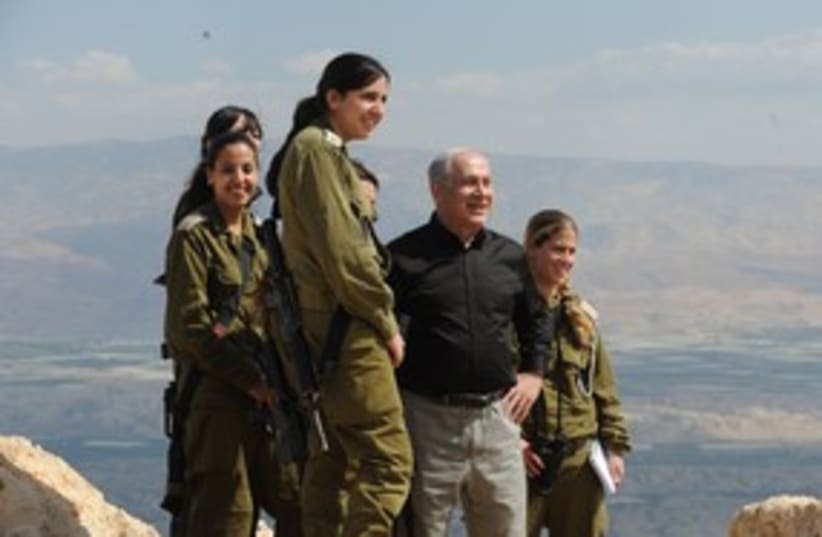Abbas: We will reject plan with any provisional borders 'PM agreed to lease Jordan Valley from Palestinians' Will Jordan become a Palestinian state? “The Jordan Valley is the eastern gate into the State of Israel,” Netanyahu told some 120 soldiers – most of them women he was addressing to mark International Women’s Day – at a base near the settlement of Masua.“Those defending the Jordan Valley are defending Israel,” he said. “If we were not here, we would not be able to defend Israel.”Earlier, at a mountaintop outlook at an IDF outpost with a commanding view of Jordan Valley, Netanyahu said, “Our security border is here, on the Jordan River, and our line of defense is here. If this line were to be broken, this would mean that it would be possible to bring in terrorists, missiles and rockets, and infiltrate them into Tel Aviv, Jerusalem, Haifa, Beersheba and throughout the country.“Our line of defense starts here, and it has no alternative,” he declared. “There is no alternative to the IDF’s line of defense.”If the Jordan Valley was Israel’s “insurance policy” before the recent upheaval in the region, Netanyahu said, this is “doubly true” today with the major unrest in the Middle East.Sources close to Netanyahu said it was not coincidental that he did not mention the settlements during his visit, since he was trying to drum up support in the international community for keeping the IDF along the Jordan River. Mentioning anything about Israeli sovereignty or retention of the settlements would simply complicate and muffle his message, they said.PA Prime Minister Salam Fayyad, meanwhile, rejected the idea of Israeli presence in the Jordan Valley, saying during a tour of Nablus that there would not be a Palestinian state without the Jordan Valley.“The Jordan Valley is an integral part of the Palestinian land occupied in 1967, just like east Jerusalem,” Fayyad was quoted by Israel Radio as saying.Netanyahu’s demand that Israel retain a security presence along the Jordan River is nothing new, and a position he has held since long before the dramatic events in the region.Government officials said Tuesday that Netanyahu had said a number of times in the past that the Israeli presence in the Jordan Valley could be reassessed over time and could be altered according to Palestinian security performance. This position, the officials stressed, has not changed.In addition, the officials pointed out that the Palestinians agreed with former prime minister Ehud Olmert on a US-led NATO force on the eastern border of a future Palestinian state. While Netanyahu insists that there be an IDF force there, he has not ruled out the possibility that this would be part of a larger framework.“This does not have to be an insurmountable obstacle,” one official said.In a related development, representatives of the Quartet – the US, EU, Russia and UN – are expected to meet Wednesday with Netanyahu’s envoy Yitzhak Molcho to discuss the current diplomatic impasse and suggestions for breaking out of it. The representatives met last week in Brussels with Palestinian negotiator Saeb Erekat.Foreign Ministry officials said a meeting at the foreign ministry level of the Quartet – originally scheduled for next week on the sidelines of a G20 meeting in Paris – had been postponed for two to three weeks. The officials denied that this was in order to give Netanyahu more time to formulate and present a new diplomatic initiative, saying the postponement had to do with a need to focus on other dramatic events in the region.Israel is concerned the Quartet might adopt a position at its next meeting tilting toward the Palestinian demand for a state inside the 1967 lines, something it has refrained from doing – primarily due to objections from the US – until now.British Foreign Secretary William Hague, during a press conference in London with visiting PA President Mahmoud Abbas, said Britain, France and Germany wanted to see clear parameters for the new negotiations, including a state within the 1967 lines with equivalent land swaps, a “just, fair and agreed solution for refugees,” and “the establishment of Jerusalem as the capital of both Israel and a Palestinian state.”Hague also welcomed a recent call for Palestinian elections, and condemned Hamas for rejecting the idea.“Hamas should not be allowed to stifle the democratic expression of Palestinian opinion,” he said.Abbas said he was ready to have legislative and presidential elections and “leave the ballot boxes to speak for themselves.”Whoever wins “would take the helm,” he said, adding that “we cannot reach a political solution without Palestinian reconciliation.”
Jonny Paul contributed to this report from London.
